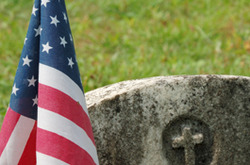HEALTH CARE CASUALTIES: Study says 2,200 veterans died in 2008 because they lacked insurance
 By Viji Sundaram, New America Media
By Viji Sundaram, New America MediaMichael Baranik Jennings called it the worst day of his life.
As he sat in his doctor's office that day in January 2007, he was told he had terminal cancer.
As if that wasn't bad enough, he was also told that his veteran'shealth care insurance wasn't adequate to cover the number ofchemotherapy sessions he would need.
Over the next few weeks, Jennings went from one doctor to another, hoping to find one who would give him the needed treatment.
"Luckily, I begged and begged a doctor, who said he would only give meseven treatments because of insurance," Jennings wrote in a letter tothe non-profit, National Nurses Organizing Committee.
But his efforts weren't enough. Jennings died a few months after he was diagnosed with terminal cancer.
Jennings story is not unique. Lack of health insurance claimed thelives of more than 2,266 veterans under the age of 65 last year, says aHarvard Medical School study out today.
That number is more than 14 times the number of deaths (155) sufferedby U.S. troops in Afghanistan in 2008, and twice as many (911 as ofOct. 31) as have died since the war began in 2003.
"Uninsured veterans are a stain on America's flag," asserted Dr.Steffie Woolhandler, one of the study's three researchers and professorof medicine at the school. "It's particularly striking that a combatveteran who has already served his country is denied [adequate] healthcare."
The Harvard researchers said that health care reform legislationpending in the House and Senate would not "significantly affect thisgrim picture."
Only a minority of veterans - those disabled by military service - is automatically eligible for VA care.
Vets who have a combat-related injury and are 100 percent disabled canget full care from the VA, said Allan Campbell, a veteran of theVietnam war. Campbell said he had to "fight for years and years beforehe could go from 10 percent care to 100 percent care."
The full-care veterans who live far from a VA hospital or clinic also get reimbursed for travel.
"I am a U.S. Navy vet," wrote a 52-year-old vet from Novato, Calif., tothe National Nurses Organizing Committee. "With the VA almost 50 milesfrom my front door, it just doesn't work for me in case of anemergency-type situation."
Woolhandler said researchers analyzed data from the U.S. CensusBureau's March 2009 Current Population Survey, which queried Americansabout their insurance coverage and veteran status.
The survey found that 1,461,615 veterans between the ages of 18 and 64were uninsured -- that is, they neither had health insurance norreceived ongoing care at Veterans Health Administration hospitals orclinics -- in 2008.
Their research found that being uninsured raises an individual's oddsof dying by 40 percent, causing 44,798 deaths in the United Statesannually among those aged 17 to 64. With that data, Woolhandler and hercolleagues arrived at their estimate of 2,266 preventable deaths ofnon-elderly veterans in 2008.
"Like other uninsured Americans, most uninsured vets are working people- too poor to afford private coverage, but not poor enough to qualifyfor Medicaid or means-tested VA care," said Woolhandler, who testifiedbefore the House Committee on Veterans Affairs in 2007 about uninsuredveterans.
The Veterans Eligibility Reform Act opened VA enrollment to allveterans, although non-poor veterans (generally, those earning morethan $30,000 a year) were required to make co-payments of up to $50 perday for outpatient care.
However, in 2002, the Bush administration ordered VA regional directorsto "stop marketing to enroll Priority 8 veterans," citing lack offinancial resources. Enrollment stopped on Jan. 17, 2003. Veteranswithout service-connected illnesses or disabilities, and with incomesabove 80 percent of the median income in their area are classified inthe lowest priority group, Priority 8.
Bowing to pressure from veterans' advocates, the Obama administrationearlier this year adjusted the income-standards means test. Thatallowed around 10 percent of uninsured vets to enroll. "But that stillleft 1.5 million of them uninsured," Woolhandler noted.
Dr. David Himmelstein, co-author of the Harvard study and associateprofessor of medicine at the school, noted that the "unnecessary deathswill continue under the legislation now before the House and Senate.
"Those bills would do virtually nothing for the uninsured until 2013,and leave at least 17 million uninsured over the long run. We need asolution that works for all veterans - and for all Americans -single-payer national health insurance."
Woolhandler said that allowing stories such as Jennings' to happen, is"a national disgrace," and "a total negation of the service they havegiven us."
Liz Jacobs, of the California Nurses Association, said Jennings was"very ill" when he contacted them two years ago. In the letter he wroteto the National Nurses Organizing Committee he said, "This is what Iget for serving my country for 24 years...If I had known this when Ijoined, I would never have joined.
"I would have left this country, given up my citizenship and lived in acountry where they respect the men and women that protect theirfreedom."
